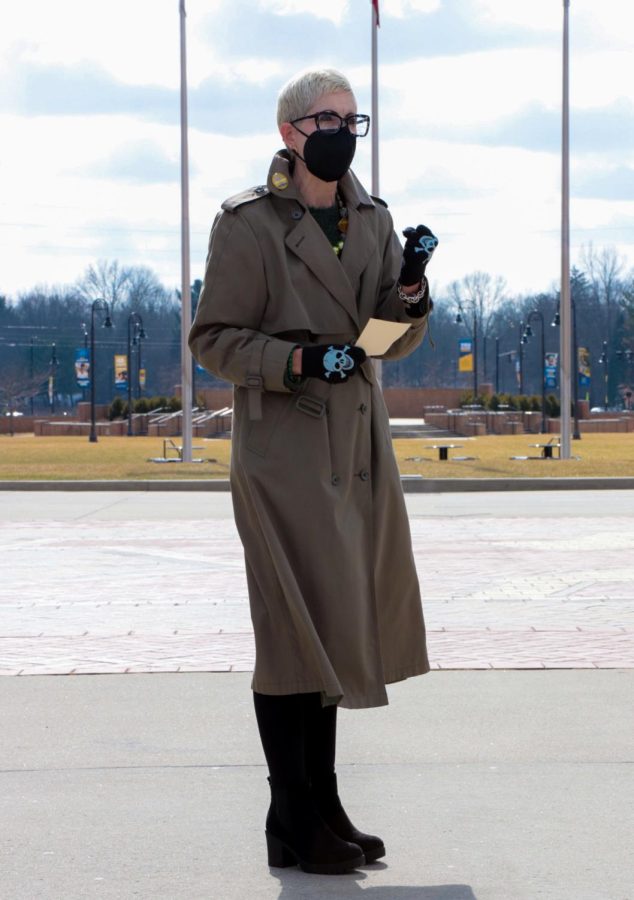Students protest House Bill 327, which seeks to ban “divisive concepts”
March 10, 2022
About 50 Kent State students gathered at 2 p.m. Wednesday at the K at Risman Plaza to express their disapproval of House Bill 327, also known as the “Prohibit teaching, advocating or promoting divisive concepts” bill.
The protest was organized by Kent Undergraduate Student Government, Ohio Student Association and Kent Black United Students. In October of 2021, USG formally condemned the bill.
The bill, which was put forth by Rep. Diane Grendell (R-Chesterland) and Rep. Sarah Arthur (R-Ashtabula), would require that “no school district shall teach, instruct, or train any divisive concepts” such as white supremacy, institutional racism and sexism. If passed, the ban would apply to state institutions including Kent State, according to language in the bill. Violation of this could result in loss of state funding.
Students gathered on the K holding signs with the names of Black, gay and female historical figures. Deanna Baccus, the director of academic affairs for BUS, read a poem written by Marissa Henley, the political director of BUS.
“This bill is meant to coddle the feelings of the majority and ignore the uncomfortableness of the minority,” Baccus read.
The bill would require teachers to give “impartial instruction on the historical oppression of a particular group of people based on race, ethnicity, class, nationality, religion, or geographic region.”
“We have a whole department of Africana Studies, so how is that going to work with this bill being passed?” Baccus asked.
Baccus was not the only one with concerns for how the bill will affect learning on campus.
“It’ll fundamentally change the whole way I receive my education,” said Jenna Gilbreath, a member of the Ohio Student Association who helped organize the protest. “My media advocacy minor is all about using the media for advocacy. That minor would not exist.”
Students at the protest admitted they would not have even heard of the bill had it not been for a discussion in their media advocacy class, discussions they believe could be at risk if it passes.
“A lot of the topics in our class, as part of the School of Media and Journalism, we talk about divisive stuff,” said Brady Warmbein, a senior public relations major. “We have to talk about this stuff because it’s the news.”
Stephanie Smith, who teaches the media advocacy class, says the bill is particularly alarming for professors of journalism and communication.
“Communication students of all disciplines must be able to immerse themselves in the humanities and history – especially to probe beyond hegemonic historical accounts to uncover histories that have been suppressed or completely silenced,” she said. “Students have the right to learn the histories of their people and all people. To do less than that puts us at grave risk of denying their human dignity and worth.”
With the potential to allow for the censorship of books in schools, Smith sees the bill as a restriction of free speech. At the protest, she encouraged students in attendance to go and purchase a book that has previously been banned from a public school.
“I do not believe that this bill is for your benefit,” she said. “I believe this bill works against you in every possible way. It decides what content you see.”
The Ohio House of Representatives took testimony surrounding the bill on March 9, allowing a vote to potentially take place within a week. Student groups have committed to keeping pressure on lawmakers.
Alton Northup is a senior reporter. Contact him at [email protected].













